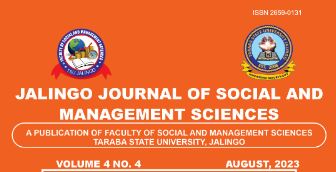Money Laundering in Nigeria: Implications on National Development in Nigeria
Keywords:
Money Laundering, Implications, National Development, NigeriaAbstract
This article examines the implications of money laundering on national development in Nigeria. The study used secondary sources/literature to gather relevant data on the subject matter. The study finds that money laundering takes place in stages-placement, layering and integration. There are institutions capable of masking proceeds from illegal criminal activities and enable money laundering in Nigeria such as currency exchange houses, stock brokerage houses, casinos, automobile dealership, and trading companies. There are also causes of money laundering in Nigeria, such as corruption, terrorism, arm trafficking, drug trafficking, tax fraud, smuggling, kidnapping among and other forms of financial crimes that permit and reinforce some organised criminal syndicates to make transnational financial transactions. It has also established that money laundering has contributed in various political, economic and social problems that retard national development in Nigeria. There are some measures put in place to address the problem of money laundering at the international continental and Nigeria levels. At the national level also, some agencies like Economic and Financial Crimes Commission (EFCC), Independent Corrupt Practices and other related Crimes (ICPC), National Financial Intelligence Unit (NFIU) and Code of Conduct Bureau (CCB) have been established to reduce the chances of illegal domestic and transnational financial crimes. Consequently, money laundering is a threat to national development in Nigeria. There are efforts by international and sub-regional governments to tackle money laundering. The article concludes that money laundering is a threat to national development in Nigeria. It also recommends that Nigeria should work together with interested countries to share information between respective public-private partnerships to ensure the most effective response to international money laundering and be committed to developing internationally endorsed guidelines for the transparent and accountable management of returned stolen assets.

Downloads
Published
Issue
Section
License
Copyright (c) 2023 JALINGO JOURNAL OF SOCIAL AND MANAGEMENT SCIENCES

This work is licensed under a Creative Commons Attribution-NonCommercial 4.0 International License.
